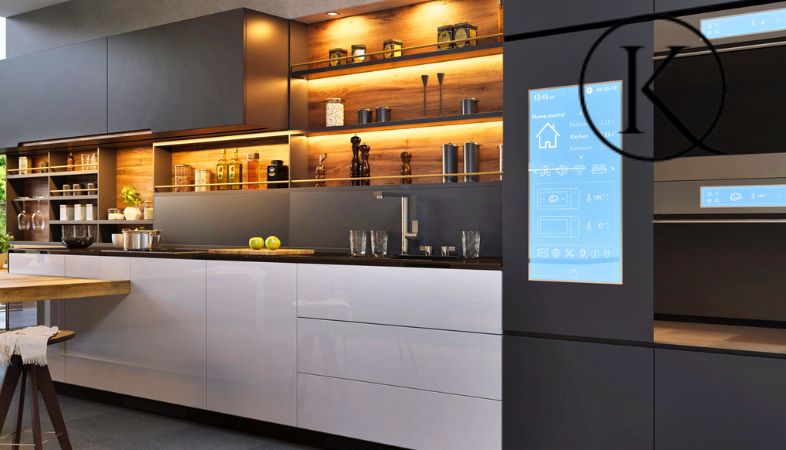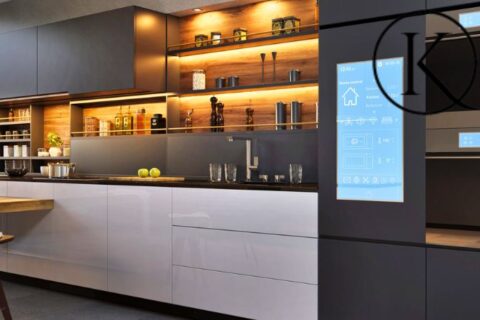Energy-efficient smart kitchens optimize resource use and reduce utility bills. They integrate advanced technology for sustainability and convenience.
Comprising high-efficiency appliances and smart systems, energy-efficient smart kitchens are revolutionizing how homeowners manage energy consumption. These intelligent kitchens utilize devices like smart refrigerators, ovens, and dishwashers, all designed to minimize electricity and water usage while maximizing functionality. With the ability to connect to smartphones or tablets, users can monitor and control their appliances remotely, ensuring a kitchen that not only saves energy but also simplifies daily tasks.
The adoption of these technologies caters to an eco-conscious audience, aligning with global efforts to conserve resources and lessen environmental impact. By integrating smart gadgets and appliances, energy-efficient smart kitchens represent a significant step towards modern, sustainable living.
Traditional Vs. Energy-Efficient Smart Kitchens Appliances
The conversation around kitchen appliances is rapidly evolving from traditional models to cutting-edge smart technology. The key distinction underpins not just ease of use but also energy efficiency and environmental impact. Navigating through the transformative world of kitchen tech, it’s important to understand the fundamental differences between traditional and smart kitchen appliances in terms of their energy consumption.
Energy Efficiency In Traditional Cooking
Traditional kitchen appliances, including gas stoves, electric ovens, and classic refrigerators, have been the cornerstone of home cooking for decades. However, their energy efficiency is often overshadowed by several limitations. Electric stoves, for example, tend to have a higher energy consumption due to slow heat adjustment capabilities and energy loss.
- Electric Ovens: Require preheating and maintain high temperatures longer than necessary, consuming more energy.
- Refrigerators: Older models are less energy-efficient, lacking the advancements in insulation and compressor technology.
- Dishwashers: May use more water and energy to heat water compared to newer, eco-friendly models.
While these traditional appliances serve their purpose, the opportunity for energy saving is relatively limited, often leading to higher utility bills and a greater carbon footprint.
Introduction To Smart Kitchen Technology
Enter the realm of smart kitchen appliances — sophisticated gadgets designed to optimize energy usage and interconnectivity. The defining feature of these appliances is their ability to provide real-time feedback, adapt to usage patterns, and integrate seamlessly with smart home systems.
| Smart Appliance | Energy Benefits |
|---|---|
| Smart Refrigerators | Monitor cooling and adjust energy use based on load and frequency of use |
| Induction Cooktops | Use electromagnetic fields for faster, more precise heating, reducing energy waste |
| Smart Ovens | Pre-heat rapidly and cook more efficiently, also allow for remote monitoring and control |
Not only do these appliances make cooking more convenient and intuitive, but they also play a significant role in lowering energy bills and promoting sustainability. Features like intelligent sensors and the ability to be controlled via smartphone apps or voice commands exemplify the strides taken in the smart appliance sector.
Choosing smart technologies for the kitchen goes beyond the allure of the latest gadgets—it’s a commitment to a sustainable lifestyle and a testament to the evolving capabilities of modern home appliances.
Eco-friendly Kitchen Design
An energy-efficient smart kitchen combines technology, efficiency, and style to create a heart of the home that is both functional and sustainable. Eco-friendly design principles are integral to curating a space that reduces carbon footprint, conserves energy, and utilizes materials that are kinder to the planet. Let’s delve into the components that make up an eco-friendly kitchen, detail the advantages of sustainable materials and appliances, and highlight the importance of energy-efficient lighting and ventilation.
Sustainable Materials And Appliances
Choosing sustainable materials for your kitchen is not only good for the environment but can also bring a unique aesthetic appeal to your home. Consider the following options for a greener kitchen:
- Countertops: Look for countertops made from recycled or renewable resources.
- Cabinetry: Select cabinets that are certified by the Forest Stewardship Council (FSC) to ensure they come from responsibly managed forests.
- Flooring: Bamboo and cork are popular eco-friendly selections that are both renewable and durable.
Appliances play a significant role in the kitchen’s overall energy consumption. Opt for appliances with the ENERGY STAR certification to maximize efficiency. Not only do they consume less energy, but they also help lower utility bills.
| Appliance | Benefits |
|---|---|
| Refrigerators | ENERGY STAR models use 15% less energy than non-certified models. |
| Dishwashers | Uses less water and energy per cycle, saving on utility costs. |
| Ovens | Convection ovens cook faster and at lower temperatures, reducing energy use. |
Energy-efficient Lighting And Ventilation
Lighting and ventilation are vital aspects of energy-efficient kitchen design. Here’s how to implement them:
- LED Lighting: LED lights are the benchmark for energy efficiency, consuming significantly less electricity than traditional bulbs and lasting longer.
- Natural Light: Maximizing natural light can reduce daytime electricity use. Consider skylights or larger windows.
- Task Lighting: Illuminate work areas with focused task lighting to avoid lighting the entire kitchen unnecessarily.
Good ventilation is essential for indoor air quality. It mitigates moisture, odors, and air pollutants. Energy-efficient range hoods that vent outside reduce energy consumption and improve your kitchen’s air quality. Ensure that the systems have an automatic shut-off feature to save energy when not in use.
Smart Appliances For Green Cooking
Embracing a sustainable lifestyle has never been easier or more necessary, and the heart of the home—the kitchen—is going smart and green. Energy-efficient smart kitchens combine advanced technology with eco-conscious practices to create a seamless, efficient cooking experience. In this post, we’re diving into the smart appliances leading the charge in green cooking, focusing on innovations that are reshaping how we think about energy-efficient stoves and ovens, as well as smart refrigeration and food preservation.
Energy-efficient Stoves And Ovens
The modern energy-efficient stove and oven are a marvel in green technology. They come equipped with features designed to minimize energy use while maximizing cooking performance. Here’s what you can expect from the latest models:
- Induction cooktops that heat up only the cookware, reducing wasted heat compared to traditional electric or gas ranges.
- Convection ovens circulate hot air to cook food more evenly and usually at a lower temperature, cutting down on cooking time and energy use.
- Programmable settings ensure you cook at the optimal temperature for just the right amount of time, preventing energy overuse.
Manufacturers have also enhanced self-cleaning options that work more efficiently, thus consuming less power and avoiding harsh chemical usage.
Smart Refrigeration And Food Preservation
Saving energy in the kitchen isn’t just about how we cook; it’s also about how we store our food. Smart refrigeration is an integral component of a green kitchen. Here are some key advances in refrigerator tech:
- Energy-saving compressor technology that adjusts cooling power based on the load and usage patterns.
- Smart cooling systems that maintain a more consistent temperature, improving food preservation and reducing waste.
- Programmable features and apps that allow you to monitor and adjust settings on the go, ensuring your fridge runs efficiently.
With this smart technology, refrigerators are becoming more adept at reducing energy consumption without sacrificing their main job—keeping your food fresh for longer.
Automation And Control Systems
Embracing the future of home convenience and energy efficiency, the rise of automation and control systems in smart kitchens marks a remarkable step forward. These systems transform the way we interact with our appliances, making sure energy consumption drops while user comfort soars to new heights. From streamlining daily tasks to monitoring resource usage, sophisticated technologies offer practical solutions that cater to eco-conscious homeowners. Delve into how interconnected devices and smarter grids contribute to the greener home of tomorrow.
Iot Integration For Energy Conservation
IoT, or the Internet of Things, is a powerhouse in optimizing energy use in smart kitchens. Integration of IoT devices directly leads to more significant conservation efforts. Here’s how:
- Automated Appliances: Your refrigerator, dishwasher, and oven now adjust their functions based on your daily patterns, minimizing electricity usage during off-peak hours.
- Sensors and Smart Meters: Equip your kitchen with the ability to detect and learn from your habits, thus reducing the waste of resources.
- Customized Control: Use your smartphone or voice commands to adjust settings on appliances for optimal energy efficiency, even when you’re away from home.
Smart Grid Connectivity And Energy Monitoring
Smart grid connectivity takes the utility of IoT devices further, allowing for real-time energy monitoring and management. Such integration enables:
- Access to energy usage data on demand, helping you make informed decisions about when and how to use your kitchen appliances.
- Seamless interaction with utility providers, where appliances can automatically adjust during peak demand to save on energy bills.
- Proactive maintenance alerts, delivered straight to your device so that appliances run efficiently and risks of energy wastage are minimized.
Frequently Asked Questions:
What Is The Most Energy-efficient Appliance In Kitchens?
The most energy-efficient kitchen appliance is typically a refrigerator with an ENERGY STAR rating. This label ensures optimal energy usage and savings.
What Is The Best Cooking Device To Save Energy?
The best cooking device to save energy is the pressure cooker. It reduces cooking time and conserves heat, leading to significant energy savings.
How Could This Kitchen Be Made More Energy-efficient?
To boost this kitchen’s energy efficiency, upgrade to ENERGY STAR appliances, install LED lighting, and seal any air leaks. Consider adding aerators to faucets to reduce water usage. Use a programmable thermostat for optimal heating and cooling.
Are Smart Appliances Energy-efficient?
Many smart appliances are designed for energy efficiency, often leveraging technology to reduce power consumption and save on utility bills.
Conclusion
Smart kitchens mark the beginning of an era where convenience and sustainability blend seamlessly. By embracing these energy-saving technologies, homeowners can enjoy significant cost savings while reducing their carbon footprint. Keep your kitchen cutting-edge and eco-friendly, forging a path to a smarter, greener future.




